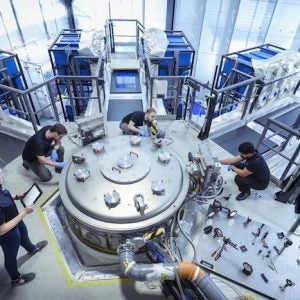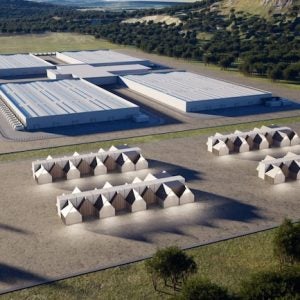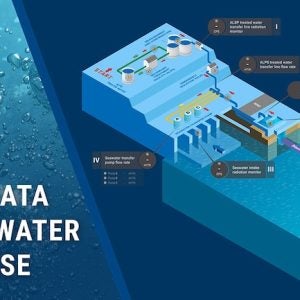 Korea Hydro & Nuclear Power (KHNP) and parent company Korea Electric Power Corp (Kepco) are reportedly in discussion with US-based Westinghouse Electric Company on possibly sharing profits from South Korean nuclear reactor exports following a legal dispute which arose when the two were competing for a new build contract in Poland.
Korea Hydro & Nuclear Power (KHNP) and parent company Korea Electric Power Corp (Kepco) are reportedly in discussion with US-based Westinghouse Electric Company on possibly sharing profits from South Korean nuclear reactor exports following a legal dispute which arose when the two were competing for a new build contract in Poland.
KHNP had reportedly offered to build six APR1400 reactors with a capacity of 8.4GWe for $26.7 billion. The Westinghouse offer was $31.3 billion for six AP1000 reactors with a total capacity of 6.7GWe, while EDF’s bid for its EPR technology was for $33-48.5 billion for four to six reactors. Polish media reported that KHNP had also proposed post-construction technology transfer to Poland and media speculation was that the contract would go to KHNP.
This prompted Westinghouse on 21 October to file a lawsuit against KHNP and Kepco in a US federal court to block them from selling reactors to Poland. Westinghouse said KHNP’s reactor design included intellectual property licensed by Westinghouse and required permission from Westinghouse before being transferred to Poland or any other countries considering deploying the APR1400 reactor. In a separate suit, it urged the South Korean government to draw up measures to address such issues.
However, KHNP said it had gained competence in the design, production and construction of NPPs in order to finally develop its own, independent technology. "Korean nuclear technology is independent of Westinghouse technology and can be exported without restrictions and without the consent of the US," it noted. In response, KHNP lodged lawsuits in the US to force Westinghouse to drop the case and also sought to go to arbitration.
In 2009, South Korea had secured a nuclear reactor order from the United Arab Emirates (UAE) for $18.6 billion, under which it agreed to build four nuclear power plants based on the South Korean model. All four have been built on time and on budget. South Korea was invited by Saudi Arabia in 2022 to participate in its nuclear reactor tender. The South Korean government was hoping to export at least 10 nuclear reactors by 2030 and also took part in a tender in the Czech Republic. KHNP is also in discussions with Uganda and Ghana about possible nuclear construction projects.
Discussions with Westinghouse are now focusing on splitting the profits in a given ratio, and clarifying how the Korean power utilities will pay royalties to Westinghouse in relation to any overseas nuclear plant orders Korea may receive.
South Korea had developed the APR1400 model based on nuclear technology from Combustion Engineering, a US-based company, the nuclear business of which was sold to Westinghouse in 2000. This could mean that any country to which South Korea exports nuclear reactors may need approval from the US executive body and Congress. However, KHNP insist that it is only the US Federal government, not Westinghouse, that is authorised to take legal action based on the US nuclear energy laws.
According to Reuters, industry observers have expressed concern about the negotiations warning that if South Korea gives in to Westinghouse’s demands it will cede too much control. “The discussion with Westinghouse will make or break South Korea’s nuclear power industry,” said one of the industry sources. “We have to find a compromise under the principle of reciprocity that will not hurt our national interests.”






